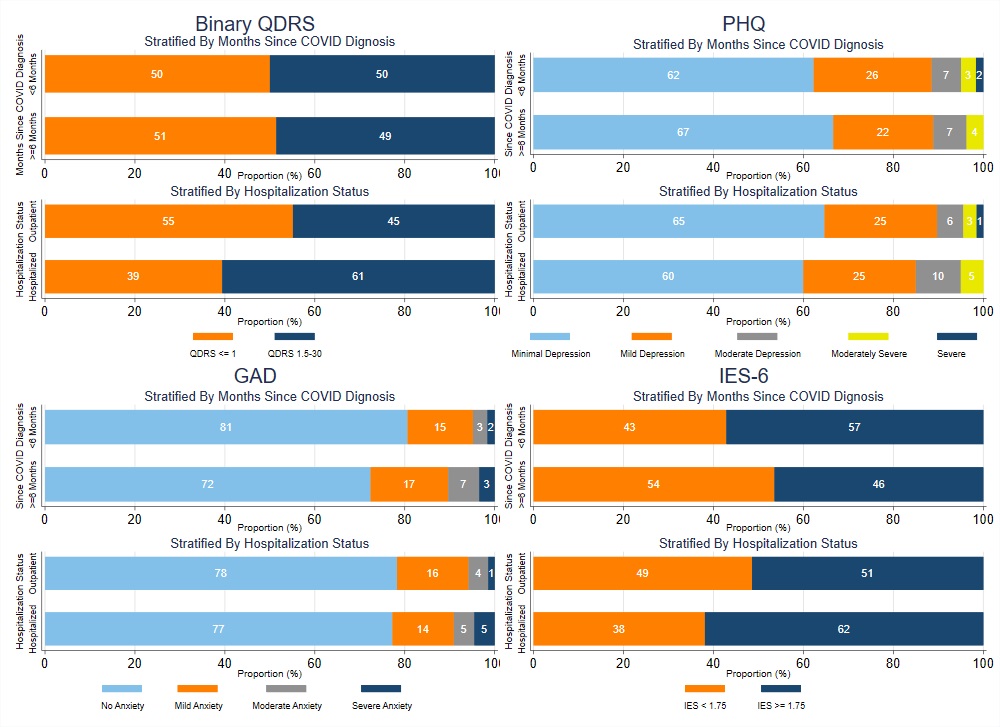Post-Acute Sequelae of Sars-Cov-2 Infection in Solid Organ Transplant Recipients
S. Alasfar1, T. Chiang1, A. J. Snyder2, M. T. Ou1, B. Boyarsky1, A. T. Abedon1, J. L. Alejo1, W. Cochran1, J. M. Garonzik-Wang3, D. C. Brennan1, T. Vannorsdall1, D. L. Segev1, R. K. Avery1
1Johns Hopkins University, Baltimore, MD, 2University of Washington, Seattle, WA, 3University of Wisconsin, Madison, WI
Meeting: 2022 American Transplant Congress
Abstract number: 161
Keywords: COVID-19, Morbidity, Psychosocial
Topic: Clinical Science » Infection Disease » 24 - All Infections (Excluding Kidney & Viral Hepatitis)
Session Information
Session Name: COVID-19 Infections Part 1: All Organs
Session Type: Rapid Fire Oral Abstract
Date: Sunday, June 5, 2022
Session Time: 5:30pm-7:00pm
 Presentation Time: 6:00pm-6:10pm
Presentation Time: 6:00pm-6:10pm
Location: Hynes Ballroom B
*Purpose: Post-acute sequelae of SARS-CoV-2 infection (PASC) is an increasingly recognized phenomenon manifested by long lasting cognitive, mental, and physical symptoms. We aimed to estimate the prevalence of PASC symptoms in solid organ transplant recipients (SOTRs) in the short (1- 6 months) and long-term (> 6 months)periods after SARS-CoV-2 infection. We also compared the prevalence of these symptoms between those with SARS-CoV-2 infection requiring hospitalization and those not requiring hospitalization.
*Methods: We surveyed 111 SOTRs with self-reported SARS-CoV-2 infection diagnosed more than 4 weeks prior to survey administration. The survey consisted of 7 validated questionnaires (“Quick Dementia Rating System (QDRS)”, “Patient Health Questionnaire (PHQ9)”, “Generalized Anxiety Disorder 7 (GAD-7)”, “Impact of Events Scale (IES-6)”, “EuroQol- 5 Dimension (EQ-5D)”, “PROMIS® global physical health scale (GHS) “and “Breathlessness, Cough and Sputum Scale (BCSS)”).
*Results: Of the 111 survey participants, 32 (33%) had been hospitalized and 35 (36%) had SARS-CoV-2 infection >6 months ago. Median (IQR) age was 58 years (46, 65). Median time from SARS-CoV-2 diagnosis was 167 days (138, 221). Cognitive impairment, anxiety, depression, insomnia, feeling of trauma, fatigue, pain, breathing problems, cough, abnormal smell, abnormal taste, and diarrhea were reported by 40%, 23%, 36%, 55%, 53%, 41%, 19%, 33%, 33%, 21%, 22%, and 32% of patients respectively. Hospitalized patients had poorer scores in cognition (QDRS survey score of 2 versus 0.75, p=0.048) (Figure 1), quality of life (EQ-5D survey score of 2 versus 1, p=0.043), physical health (PROMIS GHS survey score of 10 versus 11, p=0.013), respiratory status (BCSS survey score of 1 versus 0, p=0.056), and pain (Pain score of 3 versus 0, p 0.006). Among patients who had SARS-CoV-2 infection >6 months ago, abnormal breathing, cough, abnormal smell, abnormal taste, and diarrhea continued to be reported by 31%, 31%, 29%, 32%, and 32% of patients respectively.
*Conclusions: After SARS-CoV-2 infection, SOTRs had a high prevalence of PASC symptoms. Some of the symptoms are more severe in patients who had required hospitalization and persist beyond 6 months. Further studies are needed to understand the long term sequalae of SARS-CoV-2 infection in SOTRs and to develop an evidence-based multidisciplinary approach for caring for these patients beyond the acute phase.
To cite this abstract in AMA style:
Alasfar S, Chiang T, Snyder AJ, Ou MT, Boyarsky B, Abedon AT, Alejo JL, Cochran W, Garonzik-Wang JM, Brennan DC, Vannorsdall T, Segev DL, Avery RK. Post-Acute Sequelae of Sars-Cov-2 Infection in Solid Organ Transplant Recipients [abstract]. Am J Transplant. 2022; 22 (suppl 3). https://atcmeetingabstracts.com/abstract/post-acute-sequelae-of-sars-cov-2-infection-in-solid-organ-transplant-recipients/. Accessed February 18, 2026.« Back to 2022 American Transplant Congress

